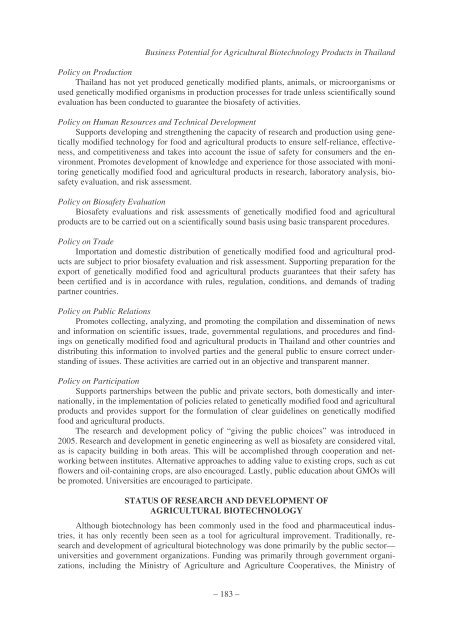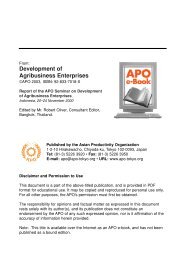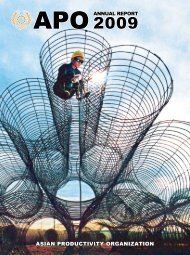Business Potential for Agricultural Biotechnology - Asian Productivity ...
Business Potential for Agricultural Biotechnology - Asian Productivity ...
Business Potential for Agricultural Biotechnology - Asian Productivity ...
Create successful ePaper yourself
Turn your PDF publications into a flip-book with our unique Google optimized e-Paper software.
<strong>Business</strong> <strong>Potential</strong> <strong>for</strong> <strong>Agricultural</strong> <strong>Biotechnology</strong> Products in Thailand<br />
Policy on Production<br />
Thailand has not yet produced genetically modified plants, animals, or microorganisms or<br />
used genetically modified organisms in production processes <strong>for</strong> trade unless scientifically sound<br />
evaluation has been conducted to guarantee the biosafety of activities.<br />
Policy on Human Resources and Technical Development<br />
Supports developing and strengthening the capacity of research and production using genetically<br />
modified technology <strong>for</strong> food and agricultural products to ensure self-reliance, effectiveness,<br />
and competitiveness and takes into account the issue of safety <strong>for</strong> consumers and the environment.<br />
Promotes development of knowledge and experience <strong>for</strong> those associated with monitoring<br />
genetically modified food and agricultural products in research, laboratory analysis, biosafety<br />
evaluation, and risk assessment.<br />
Policy on Biosafety Evaluation<br />
Biosafety evaluations and risk assessments of genetically modified food and agricultural<br />
products are to be carried out on a scientifically sound basis using basic transparent procedures.<br />
Policy on Trade<br />
Importation and domestic distribution of genetically modified food and agricultural products<br />
are subject to prior biosafety evaluation and risk assessment. Supporting preparation <strong>for</strong> the<br />
export of genetically modified food and agricultural products guarantees that their safety has<br />
been certified and is in accordance with rules, regulation, conditions, and demands of trading<br />
partner countries.<br />
Policy on Public Relations<br />
Promotes collecting, analyzing, and promoting the compilation and dissemination of news<br />
and in<strong>for</strong>mation on scientific issues, trade, governmental regulations, and procedures and findings<br />
on genetically modified food and agricultural products in Thailand and other countries and<br />
distributing this in<strong>for</strong>mation to involved parties and the general public to ensure correct understanding<br />
of issues. These activities are carried out in an objective and transparent manner.<br />
Policy on Participation<br />
Supports partnerships between the public and private sectors, both domestically and internationally,<br />
in the implementation of policies related to genetically modified food and agricultural<br />
products and provides support <strong>for</strong> the <strong>for</strong>mulation of clear guidelines on genetically modified<br />
food and agricultural products.<br />
The research and development policy of “giving the public choices” was introduced in<br />
2005. Research and development in genetic engineering as well as biosafety are considered vital,<br />
as is capacity building in both areas. This will be accomplished through cooperation and networking<br />
between institutes. Alternative approaches to adding value to existing crops, such as cut<br />
flowers and oil-containing crops, are also encouraged. Lastly, public education about GMOs will<br />
be promoted. Universities are encouraged to participate.<br />
STATUS OF RESEARCH AND DEVELOPMENT OF<br />
AGRICULTURAL BIOTECHNOLOGY<br />
Although biotechnology has been commonly used in the food and pharmaceutical industries,<br />
it has only recently been seen as a tool <strong>for</strong> agricultural improvement. Traditionally, research<br />
and development of agricultural biotechnology was done primarily by the public sector—<br />
universities and government organizations. Funding was primarily through government organizations,<br />
including the Ministry of Agriculture and Agriculture Cooperatives, the Ministry of<br />
– 183 –
















